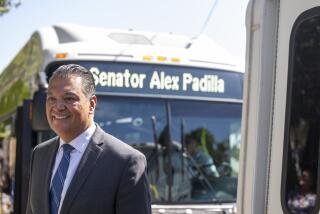Employees May Appeal Ride-Share Plans
- Share via
Air quality regulators decided Friday to allow workers to appeal their employers’ ride-share plans if they unfairly affect the poor, disabled, minorities or women.
The South Coast Air Quality Management District staff also would be able to reject an employer’s plan if it discriminates.
Several employers criticized the 9-2 decision, accusing AQMD of venturing beyond its authority by taking away their flexibility for the sake of “social engineering.”
But the change was applauded by unions representing government, hotel and maintenance workers, along with other groups representing minorities and the poor.
The ride-share program now affects about 8,000 employers of at least 100 people each in Los Angeles, Orange, Riverside and San Bernardino counties. The program requires employers to devise plans to encourage workers to car-pool, take the bus, bike or walk--anything that will get more cars and their pollutants off the roads.
The AQMD anticipates eventually extending the program to students, and to about 10,000 employers of at least 50 people each.
The push for a “social equity” clause grew out of a Los Angeles County ride-share plan, imposing parking fees on its 86,000 workers, regardless of income. The idea was to discourage solo commutes by pushing up the price.
The fees were a factor in the recent “rolling thunder” strikes by county employees. “It’s like paying to work,” said Gilbert Cedillo, general manager of Service Employees International Union Local 660. The union’s 40,000 members earn $12,000 to $25,000 a year. Those who work at the Civic Center pay $125 a month to park.
Only about 25 employers use parking fees as a ride-share tool. But, said Patricia Leyden, who heads the AQMD planning office, “parking fees are one of the more effective measures.”
Under the new rules, Leyden said, employers could use sliding scales to avoid discriminating. Employers also would have to take into account whether alternative means of transportation are available.
At the same time, the AQMD board decided that employers could submit ride-share plans every two years instead of annually.
In other action, members approved a special commission to investigate the local economic impact of its rules. The 37-member panel will hold hearings and then present its findings in May.
Some have accused board member Henry W. Wedaa of proposing the commission to try to preempt conservatives opposing his reelection to the AQMD slot reserved for a representative of Orange County cities. Wedaa denied the allegation.
The election by the Orange County League of Cities is scheduled Jan. 9. On Friday, Wedaa’s AQMD colleagues unanimously named him chairman.
More to Read
Sign up for Essential California
The most important California stories and recommendations in your inbox every morning.
You may occasionally receive promotional content from the Los Angeles Times.










